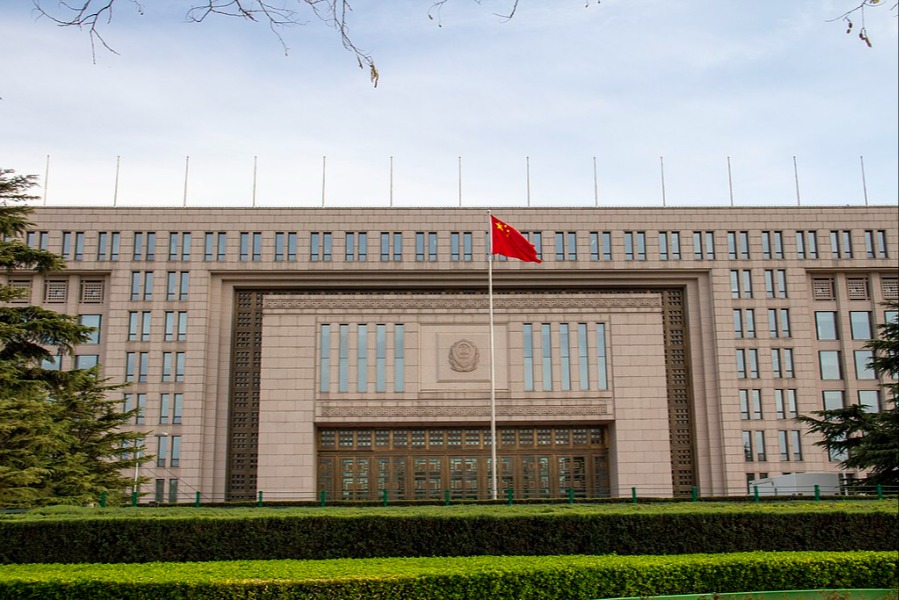The Deter Act: Congress’s Latest Effort to Discourage Election Interference
New movement may be afoot on a sanctions bill designed to deter Russian election interference. The bill, the Defending Elections from Threats by Establishing Redlines Act of 2018 (Deter Act), was introduced earlier this year by Sens. Marco Rubio (R.-Fla.) and Chris Van Hollen (D.-Md.).

Published by The Lawfare Institute
in Cooperation With

New movement may be afoot on a sanctions bill designed to deter Russian election interference. The bill, the Defending Elections from Threats by Establishing Redlines Act of 2018 (Deter Act), was introduced earlier this year by Sens. Marco Rubio (R.-Fla.) and Chris Van Hollen (D.-Md.). Although some are resisting quick movement on the legislation, there are signs that the bill will soon get a serious look. Significantly, Senate Majority Leader Mitch McConnell (R.-Ky.) has recently shown increased interest in exploring a fresh round of sanctions against Russia. Rubio and Van Hollen have suggested this examination include consideration of the Deter Act before the upcoming recess. McConnell has also hinted that the bill, or a variant of it, could be up for Senate consideration in the future.
Although the bill (and its House companion) enjoys bipartisan sponsorship, the support is far from universal. Sens. Bob Corker (R.-Tenn.), chairman of the Foreign Relations Committee, and Mike Crapo (R.-Idaho), chairman of the Banking Committee, have expressed skepticism—the former with the timing, the latter with the overall need for more legislation. And Sen. Rand Paul (R.-Ky.)—who, in the past, has been hawkish on Russia and has argued against giving the president discretion to lift sanctions—recently criticized the bill for limiting presidential power.
This post will provide a brief overview of the Deter Act’s central features. At a high level, the bill aims to dissuade Russian intervention in U.S. elections by automatically imposing serious retaliatory sanctions. Indeed, the bill requires the imposition of extraordinarily severe sanctions by mandating, against a wide variety of economic targets, full asset blocks. While a number of the bill’s targets are currently subject to some sanctions (such as debt restrictions), the act would effectively require the Treasury secretary to block all their property within U.S. jurisdiction.
Deterrence Theory
The logic of the bill is a straightforward application of deterrence theory. Deterrence employs a credible threat of retaliation in order to preemptively dissuade an adversary from taking certain actions. As Thomas Schelling, one of the intellectual founders of deterrence, explained in his seminal book, Strategy of Conflict:
The purpose is deterrence ex ante, not revenge ex post. Making a credible threat involves proving that one would have to carry out the threat, or creating incentives for oneself or incurring penalties that would make one evidently want to. … As a rule, one must threaten that he will act, not that he may act, if the threat fails.
Or as Dr. Strangelove, the mad scientist character in Stanley Kubrick’s eponymous 1964 classic film, explains:
Deterrence is the art of producing in the mind of the enemy… the fear to attack. And so, because of the automated and irrevocable decision making process which rules out human meddling, the Doomsday machine is terrifying. It's simple to understand… and completely credible and convincing.
(Interestingly, Schelling’s work was reportedly one of Kubrick’s initial inspirations for the film.)
Enshrining the sanctions in legislation with little to no enforcement discretion confers a strong degree of credibility and signals resolve, at least on the part of Congress. And, as will be discussed below, the sanctions provided for in the bill would likely be quite painful.
Trigger: DNI Determination
The Deter Act would require the director of national intelligence (DNI) to determine, within 30 days of any federal election, whether “the government of a foreign country, or any person acting as an agent of or on behalf of that government, knowingly engaged in interference in the election.” The DNI’s findings must be “submitted [to Congress] in an unclassified form but may include a classified annex,” suggesting that the public could be made aware of the DNI’s unclassified findings. Additionally, the reporting obligation is ongoing; if the DNI initially finds no interference but later determines otherwise, he or she must submit an additional report “not later than 30 days after making that determination.” And the requirement applies to the activities of any foreign power, not just Russia. The publication requirements could enhance the effectiveness of the bill’s deterrent effect. Public awareness would presumably make subsequent questioning of the DNI’s conclusions quite difficult, thereby enhancing the credibility of the threatened consequences.
The bill’s definitions also help avoid second-guessing the DNI's determination by setting the bar low for what counts as interference.
First, the bill defines interference broadly to include advertising and social media campaigns:
The term “interference,” with respect to a United States election, means any of the following actions of the government of a foreign country, or any person acting as an agent of or on behalf of such a government, undertaken with the intent to influence the election:
(A) Obtaining unauthorized access to election and campaign infrastructure or related systems or data and releasing such data or modifying such infrastructure, systems, or data.
(B) Blocking or degrading otherwise legitimate and authorized access to election and campaign infrastructure or related systems or data.
(C) Contributions or expenditures for advertising, including on the internet.
(D) Using social or traditional media to spread significant amounts of false information to individuals in the United States.
Second, the bill defines “election and campaign infrastructure” to include political campaign operations as well as government-operated equipment and databases:
The term “election and campaign infrastructure” means information and communications technology and systems used by or on behalf of—(A) the Federal Government or a State or local government in managing the election process, including voter registration databases, voting machines, voting tabulation equipment, equipment for the secure transmission of election results, and other systems; or
(B) a principal campaign committee or national committee (as those terms are defined in section 301 of the Federal Election Campaign Act of 1971 (52 U.S.C. 30101)) with respect to strategy or tactics affecting the conduct of a political campaign, including electronic communications, and the information stored on, processed by, or transiting such technology and systems.
Third, the bill employs a negligence standard by defining “knowingly” to capture both persons who actually intended to interfere with an election and those who “should have known” that their conduct would result in interference. Taken together, this would capture a broad range of potential activity by foreign governments or their agents, including both “active measures” as well as more straightforward hacking.
Consequence: Major Automatic Sanctions
While the DNI’s determination may cover interference by any foreign power, the sanctions are Russia-centric. Specifically, the Deter Act requires the president or the Treasury secretary to automatically impose sanctions within 10 days of a determination by the DNI that Russia interfered in U.S. elections. (Although the DNI’s determination is made with respect to interference by any country, the activities only trigger sanctions if Russia interfered.) Unlike most sanctions bills, the Deter Act does not include any presidential-waiver provision. And it permits only minor discretion in terms of the exact sanctions to be imposed or the entities that are to be sanctioned.
Blocking under IEEPA
It is worth noting that almost all of the sanctions which the bill would impose involve blocking property under the International Emergency Economic Powers Act (IEEPA), codified at 50 U.S.C. §1701). Specifically, the bill—using various formulations of the below language—repeatedly calls for the Treasury secretary to block property under IEEPA:
… pursuant to [IEEPA], block and prohibit all transactions in all property and interests in property ... if such property and interests in property are in the United States, come within the United States, or are or come within the possession or control of a United States person.
As the Office of Foreign Assets Control (OFAC) has explained, blocking is tantamount to freezing without seizing:
Another word for [blocking] is "freezing." It is simply a way of controlling targeted property. Title to the blocked property remains with the target, but the exercise of powers and privileges normally associated with ownership is prohibited without authorization from OFAC. Blocking immediately imposes an across-the-board prohibition against transfers or dealings of any kind with regard to the property.
OFAC also says not all sanctions it imposes require blocking assets. For example, a number of the entities which could have their assets blocked under the Deter Act are currently subject to other sanctions, such as debt-related restrictions imposed on actors operating in certain sectors of the Russian economy pursuant to the Ukraine/Russia-Related Sanctions Program. Blocking their assets would be significantly more restrictive.
(For additional background on IEEPA in the sanctions context, see here. For additional background on IEEPA more generally, including surveys of past uses, see here, here, and here).
Specific Sanctions under the Deter Act
The specific sanctions called for under the bill often, though not always, employ blocking orders. Each of the following would be automatically required within 10 days of a DNI finding of Russian interference.
- Financial Institutions: The bill requires the Treasury secretary to take significant actions against at least three of six identified Russian financial institutions (Sberbank, VTB Bank, Gazprombank, Vnesheconombank, Bank of Moscow, and Rosselkhozbank). In addition to being amongst Russia’s largest banks, each is already subject to more limited Ukraine-related sanctions. The bill allows the secretary to choose between imposing a blocking order under IEEPA or severely limit or prohibit all correspondent banking activity. The latter option appears similar to an action under Section 311 of the Patriot Act (31 U.S.C. §5318A). Either way, the targeted banks would, for all intents and purposes, be cut off from the U.S. financial system.
- Energy Companies: The bill requires the secretary to impose a blocking order under IEEPA targeting “all property and interests in property” of at least two out of Russia’s three largest energy companies—Gazprom, Rosneft, and Lukoil—each of which is already subject to more limited Ukraine-related sanctions.
- Defense and Intelligence Sectors: The bill directs the secretary to impose a blocking order under IEEPA targeting “all property and interests in property” of any entity subject to sanctions under Section 231 of the Countering America’s Adversaries Through Sanctions Act of 2017 (CAATSA), codified at 22 U.S.C. §9525). CAATSA is discussed in detail here, and the current list can be found on the State Department’s website.
- State-owned Entities Operating in Certain Sectors: The bill requires the secretary to impose a blocking order under IEEPA targeting “all property and interests in property” of any company operating in certain sectors and in which the Russian government owns at least a 25 percent stake. The sectors include “the railway or metals and mining sectors” as well as “[a]ny aerospace company or air carrier,” including relevant subsidiaries.
- Other State-owned Entities: The bill requires the secretary to impose a blocking order under IEEPA targeting “all property and interests in property” of any entity that is at least 20 percent owned by another entity that is at least 50 percent owned by the Russian government. So, if a Russian state-controlled enterprise owns at least 20 percent of a company, that company is subject to sanctions.
- Sovereign Debt Transactions: The bill orders the secretary to prohibit all transactions subject to U.S. jurisdiction in Russian sovereign debt, Russian government bonds, and the “debt of any entity owned or controlled by the [Russian government].”
- Political Figures and Oligarchs: The bill requires the president to impose a blocking order under IEEPA. It also directs the president to deny a visa to or revoke an extant visa from, “any senior foreign politiucal figure or oligarch… described in [section 241(a)(1)]” of CAATSA (i.e., the Oligarch’s List, discussed here).
Significantly, once sanctions are imposed, the Deter Act effectively mandates they remain in force until the DNI certifies that Russia has not interfered in U.S. elections for “at least 2 presidential election cycles.” Because the term “presidential election cycles” is defined to cover the period between presidential elections, the sanctions would be in place for at least eight years. Terminating the sanctions (as opposed to mere suspension) also requires that the president “receive[] reliable assurances that the [Russian government] will not engage in such interference in the future.” Thus interference would require Russia’s willingness to accept heavy, long-lasting economic consequences.
Reports
Last—and perhaps least, given the magnitude of the abovementioned sanctions—the bill includes several reporting requirements. Interestingly, it requires administration briefs every 90 days “on any government of a foreign country, or person acting as an agent of or on behalf of that government, that is determined by the President as having engaged in or being likely to engage in interference in a United States election.” The bill also requires the administration to submit within 90 days a strategy to deter potential election interference by China, Iran, and North Korea (as well as “any other foreign government determined by the President as having engaged in or being likely to engage in interference in a United States election”). As part of that report, the administration is required to identify potential retaliatory sanctions, cooperative efforts with other countries, and “a plan for communicating such deterrence actions to [the relevant] governments.”





